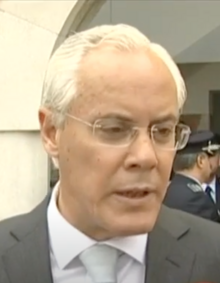
Politics in Portugal operates as a unitary multi-party semi-presidential representative democratic republic,whereby the Prime Minister of Portugal is the head of government,and the President of Portugal is the non-executive head of state with several significant political powers they exercise often. Executive power is exercised by the Government,whose leader is the prime minister. Legislative power is primarily vested in the Assembly of the Republic,although the government is also able to legislate on certain matters. The Judiciary of Portugal is independent of the executive and the legislature. The President exerts a sort of "moderating power",not easily classified into any of the traditional three branches of government.

The Socialist Party is a social-democratic political party in Portugal. It was founded on 19 April 1973 in the German city of Bad Münstereifel by militants who were at the time with the Portuguese Socialist Action. The PS is a member of the Socialist International,Progressive Alliance and Party of European Socialists,and has nine members in the European Parliament within the Progressive Alliance of Socialists and Democrats group during the 9th European Parliament. It was the governing party of Portugal between November 2015 and April 2024,subsequently winning the 2019 and 2022 legislative elections.

The Social Democratic Party is a liberal-conservative political party in Portugal that is currently the country's ruling party. Commonly known by its colloquial initials PSD,on ballot papers its initials appear as its official form PPD/PSD,with the first three letters coming from the party's original name,the Democratic People's Party. A party of the centre-right,the PSD is one of the two major parties in Portuguese politics,its rival being the Socialist Party (PS) on the centre-left.

The CDS –People's Party is a conservative and Christian democratic political party in Portugal. It is characterized as being between the centre-right and right-wing of the political spectrum. In voting ballots,the party's name appears only as the People's Party,with the abbreviation CDS–PP unchanged.

Pedro Miguel de Santana Lopes is a Portuguese lawyer and politician,who is the current Mayor of Figueira da Foz. He most notably served as prime minister of Portugal from 2004 to 2005.
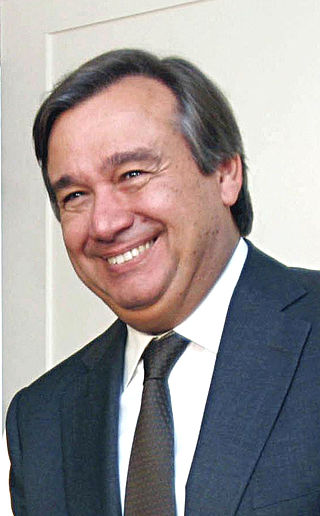
The 1999 Portuguese legislative election took place on 10 October. The election renewed all 230 members of the Assembly of the Republic.

The 1995 Portuguese legislative election took place on 1 October. The election renewed all 230 members of the Assembly of the Republic.
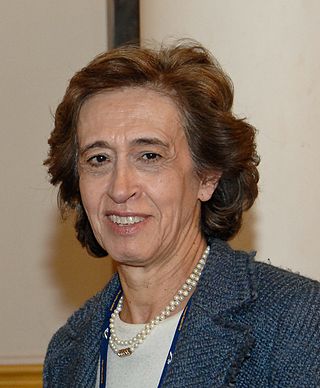
The 2009 Portuguese legislative election was held on 27 September,to renew all 230 members of the Assembly of the Republic. The Socialist Party,led by incumbent Prime Minister JoséSócrates,won the largest number of seats,but didn't repeat the overall majority they gained in 2005.

Pedro Manuel Mamede Passos Coelho is a Portuguese politician and university guest lecturer who was the 117th prime minister of Portugal,in office from 2011 to 2015. He was the leader of the Social Democratic Party (PSD) between 2010 and 2018.

Jorge Manuel Lopes Moreira da SilvaGOIH is a Portuguese engineer and politician of the Social Democratic Party serving as the Executive Director of the United Nations Office for Project Services,UNOPS,since 2023.

The 2011 Portuguese legislative election was held on 5 June,to elect all 230 members of the Assembly of the Republic. Pedro Passos Coelho led the centre-right Social Democratic Party to victory over the Socialist Party,led by incumbent Prime Minister JoséSócrates. Despite a historically low turnout of less than 60% of registered voters,the right-wing won a clear mandate,winning nearly 130 MPs,more than 56% of the seats,and just over 50% of the vote. While the People's Party,continuing the trend they began in 2009,earned their best score since 1983,the Social Democrats exceeded the expected result in the opinion polls and won the same number of seats as they did in 2002,when the PSD was led by JoséManuel Durão Barroso. Of the twenty districts of the country,Pedro Passos Coelho's party won seventeen,including Lisbon,Porto,Faro,Portalegre,Castelo Branco,Coimbra,Santarém and the Azores,that tend to favor the Socialist Party.

Miguel Fernando Cassola de Miranda Relvas is a Portuguese politician and former Secretary General of the Social Democratic Party.
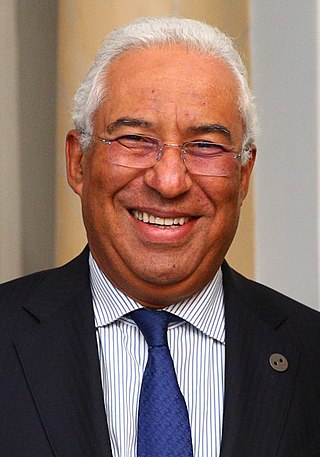
The 2015 Portuguese legislative election was held on 4 October. All 230 seats of the Assembly of the Republic were in contention.

Chega is a national conservative,right-wing populist political party in Portugal formed in 2019 by AndréVentura. It is characterized as being between the right-wing and far-right of the political spectrum.

Presidential elections are scheduled to be held in Portugal in January 2026. The elections will elect the successor to President Marcelo Rebelo de Sousa,who is barred from running for a third term.

The 2022 Portuguese Social Democratic Party leadership election was held on 28 May 2022. If no candidate achieved more than 50% of the votes in the first round,a second round would be held between the two most voted candidates in the first round on 4 June 2022,however,as only two candidates were on the ballot,Luís Montenegro and Jorge Moreira da Silva,a second round was not necessary.
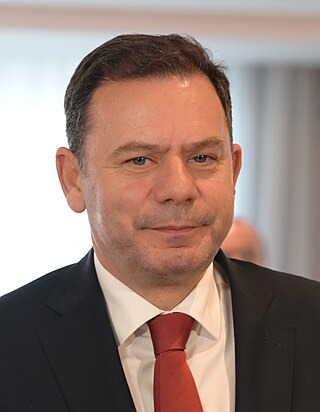
Luís Filipe Montenegro Cardoso de Morais Esteves is a Portuguese politician and lawyer currently serving as the Prime Minister of Portugal since 2024. He is the President of the Social Democratic Party (PSD) and leads the 24th Constitutional Government.

Snap legislative elections were held on 10 March 2024 to elect members of the Assembly of the Republic to the 16th Legislature of Portugal. All 230 seats to the Assembly of the Republic were up for election. The elections were called in November 2023 after Prime Minister António Costa's resignation following an investigation around alleged corruption involving the award of contracts for lithium and hydrogen businesses.

Porto is one of the 22 multi-member constituencies of the Assembly of the Republic,the national legislature of Portugal. The constituency was established in 1976 when the Assembly of the Republic was established by the constitution following the restoration of democracy. It is conterminous with the district of Porto. The constituency currently elects 40 of the 230 members of the Assembly of the Republic using the closed party-list proportional representation electoral system. At the 2024 legislative election it had 1,591,760 registered electors.

Braga is one of the 22 multi-member constituencies of the Assembly of the Republic,the national legislature of Portugal. The constituency was established in 1976 when the Assembly of the Republic was established by the constitution following the restoration of democracy. It is conterminous with the district of Braga. The constituency currently elects 19 of the 230 members of the Assembly of the Republic using the closed party-list proportional representation electoral system. At the 2024 legislative election it had 780,164 registered electors.
